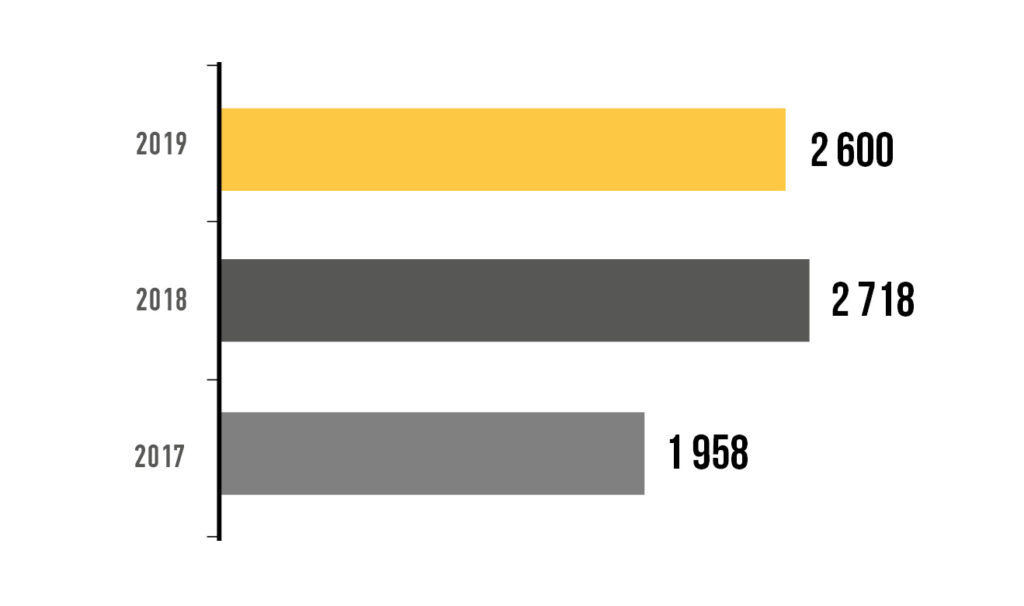Our People
The Group remains one of the largest employers in the Amur region and a major tax payer. We provide additional job opportunities by investing in education and training and by using local suppliers where possible to support the local economy.

Petropavlovsk recognises the socioeconomic influence it has as a major employer and taxpayer in the Amur region. Local hiring in the Company is around 70%, with most of our employees being from Amur region. The Group understands that its employees are a key asset and invests in them accordingly, leveraging their expertise and providing continuous development.
At the mines, shift schedules help employees to maintain their family commitments whilst ensuring operations can run throughout the year. Employees work to shift schedules of a fortnight, month, or 45 days, with their time off being equal in length to their shift. As commuting is impractical due to the remote location of the mines, employees stay in purpose-built accommodation blocks on site that have recreational facilities and modern conveniences.
The Group has an internal communications department to ensure that a regular and ongoing dialogue is maintained between employees, trade unions, management, local communities, the media and non-governmental organisations. The department also oversees the production of a free monthly newspaper designed to keep employees well informed with news from the Group’s operations.
Equal Opportunities
Petropavlovsk is committed to operating as a responsible employer, both by promoting the fair treatment of its workforce through equal opportunity, and by the absence of discrimination required under both Russian and UK law. The Group considers professional qualities of employees and is committed to providing equal opportunity to all, regardless of gender, ethnicity, race, disability or sexual orientation. As at 31 December 2019, 2,261 employees were female, representing almost a quarter of the Group’s total workforce. The ratio of female employees increased slightly when compared to 2018 and remained well above our target of 20%.
Trade Union
The Trade Union was formed in order to represent and protect social and labour rights and the professional interests of employees and to help enhance the quality of life for Trade Union members and their families. Employees can join the union freely. As at 31 December 2019, 1,599 employees were members of the Trade Union and, in a continuation of the Group’s historical record, no strikes occurred during 2019.
The trade union budget is allocated to health treatments for employees and financial assistance for workers (for the purposes of medical treatment and operations, the birth of a child, weddings and anniversaries).
Education
The Group recognises the importance of developing the next generation of employees. This led to a wide-ranging educational policy being developed which, in turn, has ensured that our employees are improving and broadening their qualifications, have job progression opportunities and are able to reach their full potential. This approach improves both their prospects and the quality of life for many other people which has benefited the wider Amur region.
The Group has a long standing programme of investing in various educational projects, including:
- The successful Pokrovskiy Mining College in Blagoveshchensk which was established by Petropavlovsk in 2008;
- Offering internships and work placements to local students;
- Providing lecturers for chemistry courses at Blagoveshchensk State Pedagogical University and geology courses of Amur State University;
- Hosting regular internal technical conferences to exchange experience and share best practice; and
- Furthering the education of its employees via internal and external training seminars and courses.
Pokrovskiy Mining College
The college aims to offer employment opportunities to graduates, provide future employees with specialised training tailored to the needs of the Group. The Pokrovskiy Mining College (PMC) is Petropavlovsk’s main centre of education.
Number of PMC Graduates

This private, not-for-profit and innovative educational institution offers a wide range of in-house training courses, including:
- Secondary education (training of mid-level specialists, skilled workers and employees);
- Additional education (retraining for a new activity, advanced training); and
- Professional training (over 40 programs).
Study, tuition and accommodation is free for students for the duration of training and those who demonstrate outstanding results receive a stipend.

